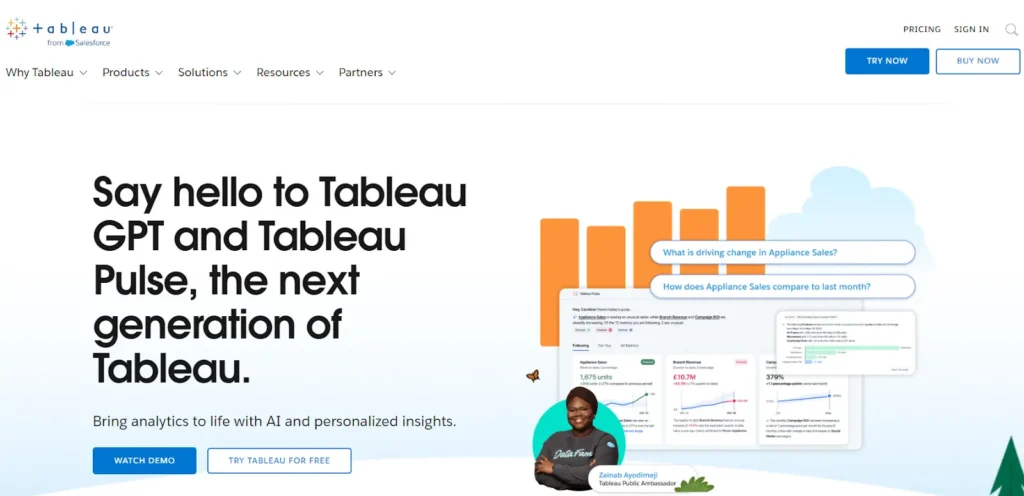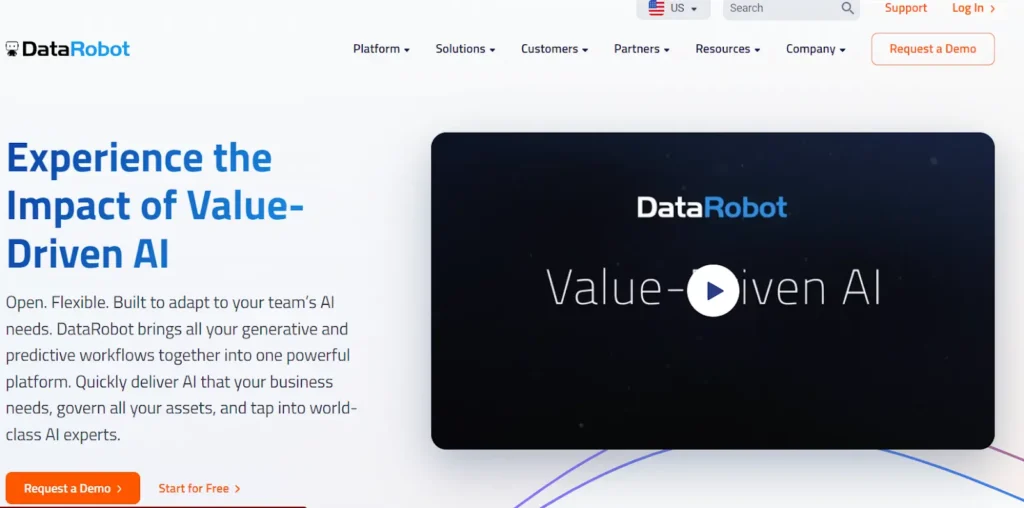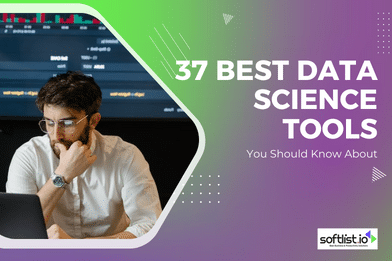In the era of big data, data scientists are at the forefront of extracting insights from vast amounts of information. To navigate this complex landscape, data science tools have become indispensable. These tools empower data scientists to efficiently process, analyze, and visualize data, enabling them to uncover hidden trends and patterns that drive decision-making.
In this article, we delve into the thirty-seven best data science tools that every data scientist should know about. From data processing to machine learning deployment, we’ve got you covered.
A Closer Look at the Best Data Science Tools
Data Science Tools for Processing and Analysis
1. Power BI

Microsoft’s business analytics service enables data scientists to visualize data and share insights across their organizations. Maximize efficiency by utilizing a comprehensive business intelligence (BI) platform to establish a unified and reliable data repository, extract more robust and meaningful findings, and effectively transfer them into tangible outcomes.
2. Python
A versatile programming language widely used by data scientists due to its rich libraries and ease of use. The development process is greatly expedited by Python’s wide array of libraries and frameworks, which offer pre-existing modules for a diverse range of activities, including web development, data analysis, artificial intelligence, and scientific computing.
The presence of a resilient ecosystem enables developers to effectively utilize pre-existing tools and functions, resulting in time and resource savings during the development of intricate applications.
3. Pandas
It is a library for Python for data manipulation and analysis that simplifies tasks like data cleaning and transformation. The library provides a wide variety of data structures, with a particular focus on the data frame.
The DataFrame is designed to imitate a table-like structure, making it highly effective for managing and examining structured data, including CSV files, Excel spreadsheets, SQL tables, and other similar formats.
4. NumPy
Essential for numerical computations in Python, it provides support for arrays, matrices, and mathematical functions. In addition to serving as a highly efficient multi-dimensional array object, NumPy offers a wide range of essential functions that are vital for scientific and numerical computing pursuits.
Fundamentally, NumPy provides an extensive assortment of mathematical functions that enable users to execute fundamental arithmetic operations, trigonometric computations, exponentiation, logarithmic calculations, and other mathematical operations, while ensuring both efficiency and accuracy.
The aforementioned functions have been specifically designed to cater to the requirements of huge datasets, hence resulting in improved performance in numerical computations.
5. SciPy
Building on NumPy, SciPy adds more advanced scientific and technical computing capabilities. One of the notable features of SciPy is in its optimization toolbox, which provides users with a diverse range of optimization methods to effectively address complex mathematics and engineering problems by identifying optimal solutions.
These algorithms play a crucial role in various domains, including machine learning, where the fine-tuning of model parameters is essential for achieving optimal performance, and engineering, where the optimization of designs is aimed at enhancing efficiency and cost-effectiveness.
6. Apache Hadoop
The Apache Hadoop software library is a platform that facilitates the distributed processing of extensive datasets across computer clusters by employing straightforward programming patterns. The system is engineered to seamlessly expand its capacity from individual servers to a multitude of computers, with each unit providing localized computational capabilities and storage.
Instead of depending on hardware to ensure high availability, the library is specifically engineered to identify and manage failures at the application layer. This enables the delivery of service with high availability by utilizing a cluster of computers, each of which may be susceptible to failures.
Data Visualization Tools
7. Matplotlib
Matplotlib is a versatile toolkit that facilitates the generation of static, animated, and interactive visualizations within the Python programming language. The Matplotlib library facilitates the execution of simple tasks with ease, while also enabling the accomplishment of complex objectives.
One of its notable strengths is its capacity to extensively personalize each element of a display, encompassing axes, labels, colors, and styles. The degree of customization provided guarantees that even complex representations can be modified to fulfill particular specifications.
8. Seaborn
Seaborn is a Python library for data visualization that is built upon the matplotlib library. The software has a sophisticated graphical user interface that enables the creation of visually appealing and useful statistical visuals.
Visualizations are frequently employed in the field of data analysis to uncover patterns, correlations, and distributions within datasets. This feature proves to be quite advantageous for individuals without design proficiency who need visually appealing illustrations for their presentations or reports.
9. Tableau

Tableau is a visual analytics platform that revolutionizes the utilization of data for problem-solving purposes, enabling individuals and entities to optimize their data resources. The platform’s value resides in its capacity to democratize data analysis, enabling individuals from diverse backgrounds to leverage the potential of their data without excessive dependence on IT or data science teams.
Tableau offers users the capability to establish connections with other data sources, including databases, spreadsheets, cloud services, and other platforms. This facilitates the integration of data from various sources, enabling a comprehensive and holistic perspective.
10. D3.js
D3, often known as D3.js, is an open-source JavaScript toolkit that facilitates the visualization of data. The low-level methodology employed in this technique, which is based on widely accepted web standards, provides an exceptional amount of adaptability in creating dynamic images that are driven by data.
11. Plotly

The Plotly Python library is a versatile and interactive open-source plotting tool that offers support for more than 40 distinct chart types, encompassing a diverse array of statistical, financial, geographic, scientific, and three-dimensional applications.
Plotly’s main distinguishing characteristic is its interactive nature, which enables users to actively interact with their visualizations, in contrast to conventional static charts. This interactive feature facilitates various activities such as zooming, panning, hovering to gain insights from the data, and even allows for custom interactions such as filtering and toggling specific data pieces. These features greatly improve the ability to investigate and comprehend intricate datasets, while also promoting a more captivating and enlightening process of data research.
12. Apache Spark

It functions as a versatile multi-language tool designed for running data engineering, data science, and machine learning tasks on either single-node machines or clusters. The platform offers an efficient means of processing and analyzing substantial amounts of data, rendering it well-suited for tasks such as data cleansing, transformation, and feature extraction within the field of data engineering.
Additionally, it is also applicable for intricate statistical analysis, pattern recognition, and predictive modeling within the realm of data science.
Harnessing the Power of Machine Learning and Algorithms
13. Scikit-Learn

Scikit-Learn, also known as sklearn, is a highly influential and extensively utilized library within the domain of machine learning and data research. The aforementioned tool plays a crucial role in the efficient and effective construction, assessment, and implementation of machine learning models. The appeal of this tool among individuals with varying levels of expertise in the subject can be attributed to its solid design, user-friendly interface, and comprehensive documentation.
14. TensorFlow
Data scientists can use TensorFlow to build, train, and deploy machine learning models. It facilitates the creation of machine learning models for several platforms, including desktop, mobile, online, and cloud, catering to both novice and proficient users.
15. PyTorch
PyTorch is a widely acclaimed deep-learning framework that has gained significant traction in the fields of artificial intelligence and machine learning. It is characterized by its dynamic nature and open-source architecture, which have contributed to its widespread adoption and appeal among researchers and practitioners in these domains.
It has gained significant recognition among academics, developers, and practitioners due to its notable attributes such as flexibility, intuitive design, and efficiency. It has emerged as a preferred option for individuals aiming to address intricate problems within the domain of deep learning.
15. Keras
Built on top of TensorFlow, Keras simplifies the process of building and training neural networks. Keras prioritizes the optimization of debugging speed, code elegance, and conciseness, maintainability, and deployability. When opting for Keras, the codebase becomes more compact, enhances readability, and facilitates iterative processes.
16. XGBoost
XGBoost is a sophisticated distributed gradient boosting library that has been specifically engineered to exhibit exceptional efficiency, adaptability, and portability. This system utilizes machine learning methods within the Gradient Boosting framework. XGBoost offers a parallel tree-boosting algorithm, commonly referred to as GBDT or GBM, which effectively addresses numerous data science challenges with high efficiency and precision.
The code exhibits compatibility with prominently distributed environments such as Hadoop, SGE, and MPI, enabling its execution across these platforms. Furthermore, it possesses the capability to address problems of considerable magnitude, surpassing the scale of billions of cases.
17. AutoML
Automated Machine Learning (AutoML) encompasses a range of techniques and procedures that aim to democratize the field of Machine Learning by enabling those without specialized expertise in this domain to effectively utilize its capabilities. The primary objectives of AutoML include enhancing the efficiency of Machine Learning operations and expediting advancements in Machine Learning research.
18. Amazon SageMaker

This platform offers comprehensive support for constructing, training and implementing machine learning (ML) models across various applications. It provides users with fully managed infrastructure, tools, and processes.
SageMaker is a versatile platform that caters to various applications, including picture and text analysis, predictive analytics, and recommendation systems. This enables both individuals and organizations to effectively utilize machine learning capabilities without the burden of handling intricate technical aspects.
Data Management and Integration
19. Apache Kafka
Apache Kafka is a widely adopted open-source distributed event streaming platform that is utilized by numerous organizations for the purpose of establishing high-performance data pipelines, conducting streaming analytics, facilitating data integration, and supporting mission-critical applications.
20. Apache Airflow
The Airflow™ platform is an open-source tool created by a community of developers. It’s designed to facilitate the creation, scheduling, and monitoring of workflows through programmable means.
With Airflow, users can define tasks and their dependencies, set up schedules for task execution, and monitor the progress and outcomes of these workflows. This platform is especially useful for automating and managing complex tasks and processes in a structured and organized manner.
21. Azure SQL

Azure SQL refers to Microsoft’s cloud-based relational database service that is part of the Azure cloud computing platform. It offers a fully managed and scalable solution for hosting SQL databases in the cloud. Azure SQL provides various deployment options, including single databases for individual applications and elastic pools for consolidating multiple databases.
It supports features like automatic backups, high availability, security enhancements, and intelligent performance tuning. Azure SQL is designed to streamline database management, reduce administrative overhead, and ensure reliable data storage and retrieval for applications hosted on the Azure platform.
22. MongoDB
The document architecture of MongoDB Atlas allows developers to store data in the form of JSON-like objects that closely resemble the objects used in application code. MongoDB Atlas allows users to utilize their preferred tools and programming languages. Clusters can be effectively managed using MongoDB CLI for Atlas, as well as Infrastructure as Code (IaC) tools such as Terraform or Cloudformation.
Machine Learning Deployment and Integration
23. Flask
A lightweight web framework in Python that helps deploy machine learning models as web applications. Flask helps developers design web apps, including those that entail deploying machine learning models. It provides the basic tools and structure needed to construct web interfaces for machine learning models, making it easier to exhibit and interact with these models through a web browser.
24. Docker
Containers simplify the deployment of applications, ensuring consistency across different environments. Docker offers a comprehensive range of development tools, services, reliable content, and automated processes that may be utilized independently or in conjunction to expedite the deployment of safe applications.
25. Heroku
A cloud platform that enables easy deployment and scaling of applications, including machine learning models. Heroku offers a platform-as-a-service (PaaS) solution, thereby relieving developers from the responsibility of managing the underlying infrastructure. This feature is especially attractive to individuals who prioritize the development and implementation of their applications while avoiding the complexities associated with server configuration, upkeep, and scalability considerations.
Open-Source Machine Learning Tools
26. H2O.ai
It is an open-source generative artificial intelligence (AI) system, that provides businesses with the capability to possess extensive language models while maintaining ownership of their data. One notable aspect of H2O.ai’s approach is its strong focus on the concept of data ownership. Numerous artificial intelligence models, particularly those of substantial size such as language models, necessitate an extensive volume of data in order to achieve optimal training outcomes.
Nevertheless, the centralized nature of certain AI platforms has given rise to apprehensions around data privacy and ownership. H2O.ai appears to tackle this issue by enabling enterprises to leverage extensive language models while maintaining control over their data ownership.
27. Caffe
A deep learning framework that focuses on speed, modularity, and expressive power. Caffe has been specifically engineered to provide exceptional performance, rendering it highly suitable for applications that require timely execution and extensive training of neural networks on a wide scale. The improved implementation of neural network layers and operations enables efficient computing, resulting in reduced model training and inference times.
28. Fastai
Built on PyTorch, Fastai simplifies the process of training accurate and efficient neural networks. The software accomplishes this by offering a user-friendly interface that simplifies the complexities associated with the building and training of deep learning models. Fastai provides a diverse array of robust tools and functions, including pre-existing architectures, data augmentation approaches, and learning rate schedulers, which effectively diminish the necessity for human adjustment and experimentation.
Streamlining Data Management and Cleaning
29. OpenRefine
OpenRefine is a robust, cost-free, open-source software that is utilized for managing unstructured data. Its functionalities include data cleansing, format conversion, and integration with online services and external data sources. Data frequently arrives in disorganized formats, characterized by the presence of discrepancies, errors, and abnormalities. The main advantage of OpenRefine is its capacity to effectively cleanse and standardize data, automating tasks such as deduplication, text normalization, and pattern identification.
30. Trifacta

Offers a user-friendly interface for cleaning and preparing diverse datasets efficiently. In addition to its intuitive UI, Trifacta possesses robust data transformation functionalities. The software provides a diverse range of pre-existing functions, algorithms, and patterns that optimize the execution of operations such as data parsing, splitting, merging, and aggregating. This feature assists customers in achieving data standardization across many sources and formats, hence ensuring the consistency and accuracy of the data.
31. DataRobot

DataRobot consolidates all generative and predictive activities into a unified and robust platform. Efficiently provide the AI solutions required by your organization, effectively manage all assets, and access the expertise of highly skilled professionals in the field of artificial intelligence.
32. Featuretools
A Python library designed for automated feature engineering, simplifying the process of creating relevant features for machine learning models. This approach demonstrates significant utility in the analysis of organized or tabular data, particularly when considering the interconnections between entities and their temporal dimensions. Featuretools utilizes advanced methodologies such as deep feature synthesis, which encompasses the amalgamation and manipulation of pre-existing variables in order to generate novel and insightful features.
Cluster Computing and Big Data
33. Dask
A parallel computing library that seamlessly integrates with popular Python libraries like Pandas and NumPy. These structures facilitate users in executing operations on datasets that exceed the memory capacity by partitioning them into smaller, manageable segments that can be processed concurrently.
34. KNIME
A platform that allows data scientists to create, deploy, and manage data workflows, making data manipulation and analysis more accessible. Fundamentally, KNIME provides a visually intuitive interface that utilizes a drag-and-drop methodology, rendering it accessible to users with varying technical proficiency levels.
The utilization of this visual workflow design obviates the necessity for a profound understanding of coding, enabling users to develop workflows by assembling pre-existing nodes that symbolize diverse data processing jobs.
35. Apache Hive
The Apache Hive is a data warehouse system that operates in a distributed manner and is designed to be fault-tolerant. It allows for large-scale analytics and supports the manipulation of vast amounts of data stored in distributed storage systems through the use of SQL.
Advanced Analytics and Data Exploration
36. R
A programming language and environment for statistical computing and graphics, favored by data scientists for its analysis capabilities. R is an open-source programming language, denoting that its source code is made freely accessible to the general public. This characteristic facilitates a broad community of users to actively participate in the advancement and improvement of the language.
37. Jupyter
An interactive notebook that allows data scientists to create and share documents containing live code, equations, visualizations, and narrative text. Jupyter notebooks function through web browsers, facilitating users’ ability to remotely view and engage with their work. The platform’s interactive nature fosters an iterative analysis process, wherein code can be updated and re-executed in response to insights derived from data exploration.
Concluding Impressions
In the rapidly evolving field of data science, having a toolkit of reliable and efficient tools is essential for success. From data processing to machine learning deployment, the thirty-seven best data science tools listed above cater to the diverse needs of data scientists. These tools are used by data scientists worldwide to wrangle, analyze, and draw insights from raw data, enabling them to contribute to the growing trend of data-driven decision-making.
As technology continues to advance, these tools will play an increasingly vital role in shaping the future of data science and analytics. We invite you to explore a treasure trove of insights and knowledge housed within our extensive collection of supplementary blogs.
These meticulously crafted pieces serve as a reservoir of in-depth analysis, varied perspectives, and thought-provoking content that intricately weave together to offer a comprehensive understanding of the topic. So, unleash your data prowess and explore the vast landscape of possibilities that these tools offer! Visit our blog to learn more about data science tools.
FAQs
What is the importance of data science tools?
Data science tools are essential for data scientists as they enable efficient data analysis and exploration. These tools provide the necessary functionality to process, transform, and visualize complex data sets, allowing data scientists to derive meaningful insights and make informed decisions.
How do data scientists benefit from using data science tools?
Data scientists benefit from using data science tools in several ways. These tools automate various data processing tasks, saving time and effort. They also provide advanced analytics capabilities, allowing data scientists to perform complex data analyses and develop predictive models. Additionally, data science tools facilitate collaboration and enable data scientists to share their work with other team members.
What are some commonly used data science tools?
Some commonly used data science tools include Python, TensorFlow, SAS, Apache Hadoop, and many others. These tools are widely used by data scientists and developers to work with data sets, write and execute Python code, perform machine learning tasks, and develop applications for data analysis and visualization.
Can data science tools be used for deep learning tasks?
Yes, data science tools such as TensorFlow can be used for deep learning tasks. TensorFlow is an open-source deep-learning library developed by Google. It provides a high-level API for building and training neural networks, making it a popular choice among data scientists for deep learning projects.
Are data science tools compatible with different programming languages?
Yes, data science tools are often designed to be compatible with multiple programming languages. For example, Python-based tools are widely used in the data science community due to the language’s versatility and rich ecosystem. These tools allow data scientists to write and execute Python code for various data analysis tasks.
Can data science tools be used for data visualization?
Yes, data science tools include features that enable data visualization. Many tools provide graphing and plotting capabilities, allowing data scientists to create visual representations of data sets. These visualizations help in understanding trends, patterns, and relationships within the data.
Are there data science tools available for application development?
Yes, there are data science tools available for application development. Some tools provide APIs and frameworks that enable data scientists and developers to build applications that leverage data analysis and machine learning. These tools facilitate the development of data-driven applications for a variety of purposes, ranging from predictive analytics to recommendation systems.
What is the role of Apache Hadoop in data science?
Apache Hadoop is an open-source framework commonly used in data science. It provides a distributed processing framework called MapReduce, which enables large-scale data processing and analysis. Data scientists often utilize Apache Hadoop for tasks such as data cleaning, transformation, and analysis of big data sets.
Can data science tools be used for classification tasks?
Yes, data science tools often include algorithms and functionalities for classification tasks. These tools enable data scientists to build classification models that can predict the class or category of a particular data point based on its characteristics. Classification models are widely used in various domains, including marketing, finance, and healthcare.
Do data science tools require prior experience in data science?
While prior experience in data science can be beneficial, many data science tools are designed to be accessible to both experienced data scientists and beginners. These tools often provide user-friendly interfaces, documentation, and tutorials to help users get started with data analysis and modelling. However, a solid understanding of data science concepts and techniques can contribute to more effective use of these tools.







